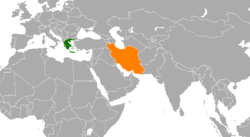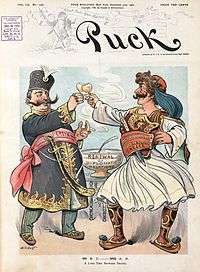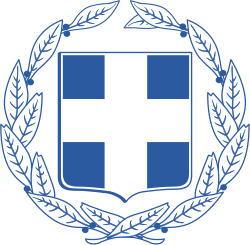Greece–Iran relations
 |
|
Greece |
Iran |
|---|---|
Greek-Iranian relations are foreign relations between Greece and Iran. The two countries have had relations for thousands of years, and share great historical and cultural ties. Greece has an Embassy in Tehran, and Iran is represented by its Embassy in Athens.
History

Ancient
Achaemenid Empire - Classical Period - Hellenistic Period
Relations between the two people date back from the antiquity and well before the Persian invasion of Greece. By the late 6th century BC, the Achaemenid Persian Empire was in control over all of Asia Minor (which included many ethnically Greek areas), as well as many of the Greek islands, Thrace, and the kingdom of Macedonia, the latter two which make up large parts of modern-day northern Greece. There is also the report by Strabo of an Athenian delegation to Persia in 432 BC.[1] The relations have evolved from sworn rivalry during the Greco-Persian wars to strong cordiality, since Alexander the Great defeated the Persian Empire. Alexander admired Persian culture, and wanted to create a mixture of Greek and Persian culture which would forever bind and commemorate the two peoples. This legacy of strong cordiality would thus be found back for many more centuries in various parts of the world named as the Greco-Persian culture. A harmonious blend of both Greek and Persian cultural aspects. The Kingdom of Pontus was a prime example of an entity (in Asia Minor) where Iranian and Greek culture, ethnicity, idendity, amongst others, mingled.
Medieval
Sasanian Empire - Byzantine Empire
Sasanian Empire and Byzantine Empire (Greece was part of Byzantine Empire), were the main powers in Europe, Western Asia, Central Asia. There were many conflicts between them (Byzantine–Sasanian wars).
Modern
There is a small Christian Greek community in Iran.[2] In Tehran, there is a Greek Orthodox church which opens mostly during the Greek Holy Week.[2]
See also
References
- ↑ D. J. Mosley,Archipresbeutai, Hermes, Vol. 94, No. 3 (1966), pp. 377-381.
- 1 2 Hellenic Ministry of Foreign Affairs http://www.mfa.gr/blog/dimereis-sheseis-tis-ellados/iran/

